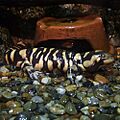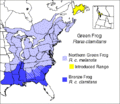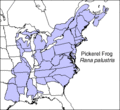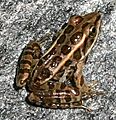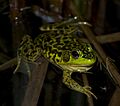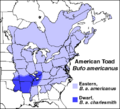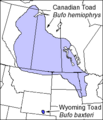List of amphibians of Minnesota facts for kids
A list of all the amazing amphibians you can find living in Minnesota! Amphibians are cool creatures that can live both in water and on land. They include salamanders, frogs, and toads. Minnesota is home to many different kinds of these fascinating animals.
Salamanders in Minnesota
There are eight different kinds of salamanders that call Minnesota home. These shy creatures often hide under logs or in wet places.
Spotted Salamander
The Spotted salamander is a chunky, dark salamander with bright yellow spots. It loves to live in forests near ponds. These spots help it stand out!
- Scientific name: Ambystoma maculatum
- Status: Least concern (meaning it's not currently endangered)
Blue-spotted Salamander
The Blue-spotted salamander is a slender, dark salamander with small blue or bluish-white spots. They are often found in damp woodlands.
- Scientific name: Ambystoma laterale
- Status: Least concern
Western Tiger Salamander
The Western tiger salamander is one of the largest land salamanders in North America. It has a dark body with yellow blotches or bars. They are often found near ponds and lakes.
- Scientific name: Ambystoma mavortium
- Status: Least concern
Eastern Tiger Salamander
The Eastern tiger salamander looks a lot like its western cousin. It has a dark body with yellow or olive-green spots. These salamanders spend most of their lives underground.
- Scientific name: Ambystoma tigrinum
- Status: Least concern
Four-toed Salamander
The Four-toed salamander is a small salamander with a reddish-brown back and a white belly with black spots. It has a special pinch in its tail near its body.
- Scientific name: Hemidactylium scutatum
- Status: Special concern (meaning its population needs to be watched)
Common Mudpuppy
The Common mudpuppy is a unique salamander that lives its whole life in water. It has feathery red gills on the outside of its head, which it uses to breathe underwater.
- Scientific name: Necturus maculosus
- Status: Least concern
Central Newt
The Central newt is a type of salamander that changes its appearance throughout its life. Young newts, called "efts," are bright orange or red and live on land. Adults are greenish and live in water.
- Scientific name: Notophthalmus viridescens
- Status: Least concern
Red-backed Salamander
The Red-backed salamander is a small, slender salamander. It often has a red stripe down its back, but some can be all gray or black. They live in forests and don't need water to lay their eggs.
- Scientific name: Plethodon cinereus
- Status: Least concern
Frogs in Minnesota
Minnesota is home to eleven different kinds of frogs. Frogs are known for their jumping abilities and their loud calls, especially during spring.
Blanchard's Cricket Frog
The Blanchard's cricket frog is a tiny frog, usually brown or gray, with bumpy skin. It makes a clicking sound like crickets. This frog is very rare in Minnesota.
- Scientific name: Acris blanchardi
- Status: Least concern, but endangered in Minnesota
Cope's Gray Treefrog
Cope's gray treefrog is a master of camouflage! It can change its skin color to match tree bark. It has a loud, harsh trill call.
- Scientific name: Hyla chrysoscelis
- Status: Least concern
Gray Treefrog
The Gray treefrog looks very similar to Cope's gray treefrog and can also change its color. The best way to tell them apart is by their call, which is a slower, more musical trill.
- Scientific name: Hyla versicolor
- Status: Least concern
Spring Peeper
The Spring peeper is a very small frog with a dark "X" mark on its back. Its loud, high-pitched "peep" call is one of the first sounds of spring.
- Scientific name: Pseudacris crucifer
- Status: Least concern
Boreal Chorus Frog
The Boreal chorus frog is a small, slender frog with three dark stripes down its back. Its call sounds like someone running a finger over a comb.
- Scientific name: Pseudacris maculata
- Status: Least concern
Bullfrog
The Bullfrog is the largest frog in North America! It can grow very big and has a deep, booming call that sounds like "jug-o-rum."
- Scientific name: Lithobates catesbeianus
- Status: Least concern
Green Frog
The Green frog is a common frog often found near ponds and streams. It has a distinct ridge that runs from behind its eye down its back. Its call sounds like a loose banjo string.
- Scientific name: Lithobates clamitans
- Status: Least concern
Pickerel Frog
The Pickerel frog has a light brown body with dark, rectangular spots arranged in rows. It produces a skin secretion that can be irritating to predators.
- Scientific name: Lithobates palustris
- Status: Least concern
Northern Leopard Frog
The Northern leopard frog is a medium-sized frog with dark, round spots that look like leopard spots. It's a great jumper and can be found in many different habitats.
- Scientific name: Lithobates pipiens
- Status: Least concern
Mink Frog
The Mink frog gets its name because it can release a smell similar to a mink when handled. It has dark blotches on a green or brown body and is often found in cool, clear waters.
- Scientific name: Lithobates septentrionalis
- Status: Least concern
Wood Frog
The Wood frog is known for its ability to survive freezing temperatures by producing a natural antifreeze in its body. It has a dark "mask" around its eyes.
- Scientific name: Lithobates sylvaticus
- Status: Least concern
Toads in Minnesota
There are three different kinds of toads found in Minnesota. Toads usually have drier, bumpier skin than frogs and spend more time on land.
American Toad
The American toad is a very common toad with warty, brown or gray skin. It has one or two large warts within each dark spot on its back. Its call is a long, musical trill.
- Scientific name: Anaxyrus americanus
- Status: Least concern
Great Plains Toad
The Great Plains toad has a light stripe down the middle of its back and many dark spots with lighter edges. It lives in drier, open areas like grasslands.
- Scientific name: Anaxyrus cognatus
- Status: Least concern
Canadian Toad
The Canadian toad is similar to the American toad but usually has three or more warts within each dark spot on its back. It prefers sandy or gravelly areas.
- Scientific name: Anaxyrus hemiophrys
- Status: Least concern
Images for kids
 | Janet Taylor Pickett |
 | Synthia Saint James |
 | Howardena Pindell |
 | Faith Ringgold |




